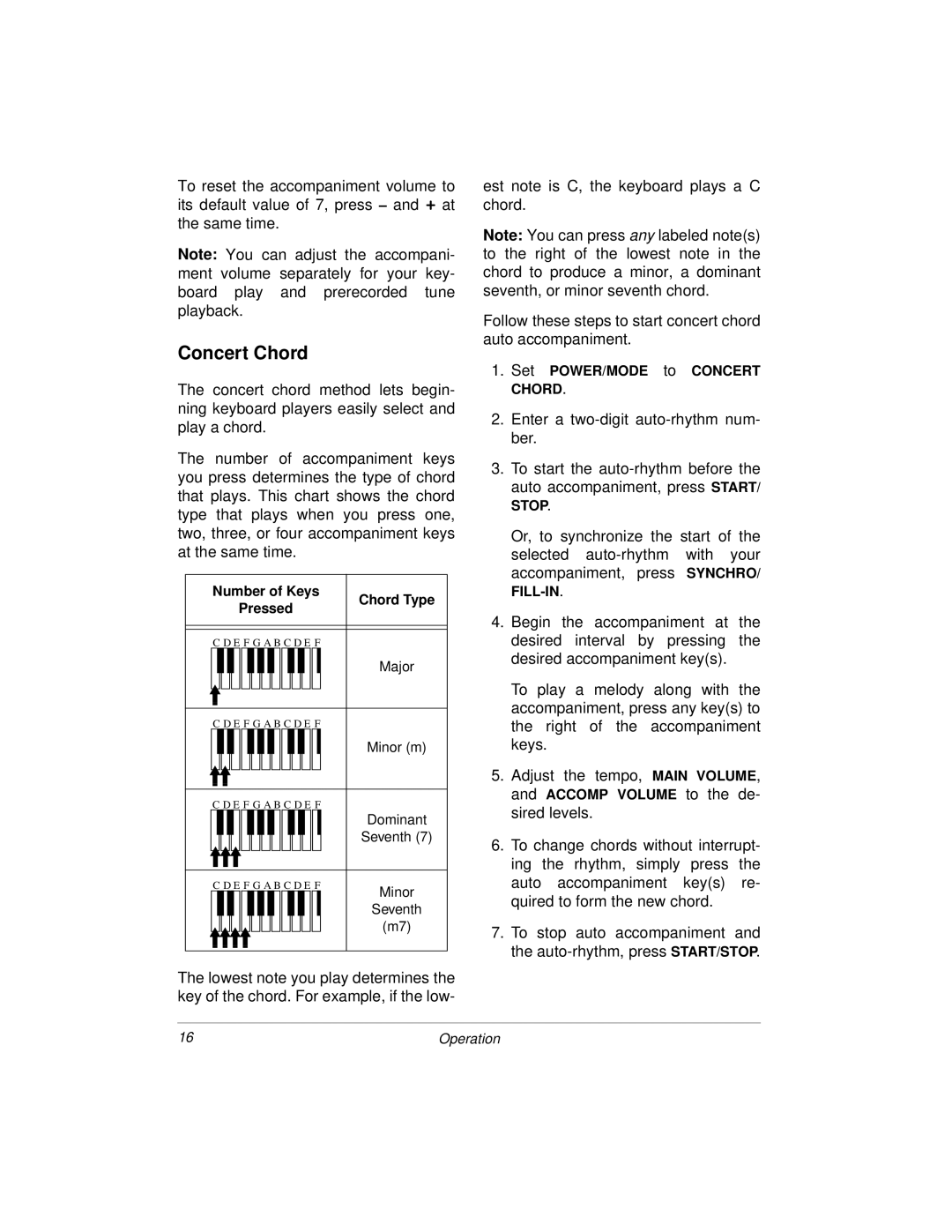
To reset the accompaniment volume to its default value of 7, press – and + at the same time.
Note: You can adjust the accompani- ment volume separately for your key- board play and prerecorded tune playback.
Concert Chord
The concert chord method lets begin- ning keyboard players easily select and play a chord.
The number of accompaniment keys you press determines the type of chord that plays. This chart shows the chord type that plays when you press one, two, three, or four accompaniment keys at the same time.
| Number of Keys | Chord Type | |||||||||
| Pressed | ||||||||||
|
| ||||||||||
|
|
|
|
|
|
|
|
|
|
|
|
|
|
|
|
|
|
|
|
|
|
|
|
| C D E F G A B C D E F |
| |||||||||
|
|
|
|
|
|
|
|
|
|
| Major |
|
|
|
|
|
|
|
|
|
|
|
|
|
|
|
|
|
|
|
|
|
|
|
|
|
|
|
|
|
|
|
|
|
|
|
|
|
|
|
|
|
|
|
|
|
|
|
|
| C D E F G A B C D E F |
| |||||||||
|
|
|
|
|
|
|
|
|
|
| Minor (m) |
|
|
|
|
|
|
|
|
|
|
|
|
|
|
|
|
|
|
|
|
|
|
|
|
|
|
|
|
|
|
|
|
|
|
|
|
|
|
|
|
|
|
|
|
|
|
|
|
| C D E F G A B C D E F |
| |||||||||
|
|
|
|
|
|
|
|
|
|
| Dominant |
|
|
|
|
|
|
|
|
|
|
| Seventh (7) |
|
|
|
|
|
|
|
|
|
|
| |
|
|
|
|
|
|
|
|
|
|
|
|
|
|
|
|
|
|
|
|
|
|
|
|
|
|
|
|
|
|
|
|
|
|
|
|
|
|
|
|
|
|
|
|
|
|
|
|
| C D E F G A B C D E F | Minor | |||||||||
|
|
|
|
|
|
|
|
|
|
| |
|
|
|
|
|
|
|
|
|
|
| Seventh |
|
|
|
|
|
|
|
|
|
|
| (m7) |
|
|
|
|
|
|
|
|
|
|
|
|
|
|
|
|
|
|
|
|
|
|
|
|
|
|
|
|
|
|
|
|
|
|
|
|
The lowest note you play determines the key of the chord. For example, if the low-
est note is C, the keyboard plays a C chord.
Note: You can press any labeled note(s) to the right of the lowest note in the chord to produce a minor, a dominant seventh, or minor seventh chord.
Follow these steps to start concert chord auto accompaniment.
1.Set POWER/MODE to CONCERT CHORD.
2.Enter a two-digit auto-rhythm num- ber.
3.To start the
Or, to synchronize the start of the selected
4.Begin the accompaniment at the desired interval by pressing the desired accompaniment key(s).
To play a melody along with the accompaniment, press any key(s) to the right of the accompaniment keys.
5.Adjust the tempo, MAIN VOLUME, and ACCOMP VOLUME to the de- sired levels.
6.To change chords without interrupt- ing the rhythm, simply press the auto accompaniment key(s) re- quired to form the new chord.
7.To stop auto accompaniment and the
16 | Operation |
